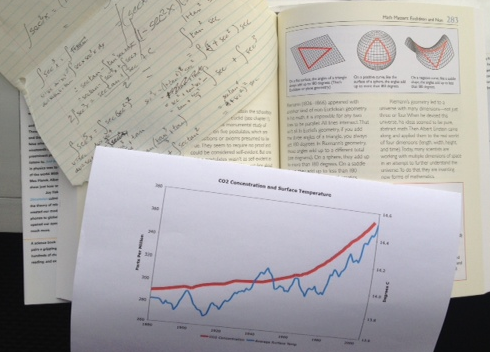Math and Reading Need Each Other
Historically, designers of secondary schools, authors of standards, test writers, and teachers have somehow created and perpetuated a misconception: that reading and math are entirely separate “subjects” having little to do with one another, that one ought not to have to read in math class any more than one should expect to order pizza at a sushi restaurant. But math and reading need each other. Reading is all about making sense of the world, deepening one’s understanding. This purpose is central to math, too.
Math learners, as well as professionals who use math in their work, read constantly. The texts we work with can include narrative explanations and prose, yet our reading extends beyond these to include rich and varied material: diagrams, equations, graphs, charts, tables, formulae, and more. To effectively read each of these as mathematicians, learners need to be familiar with the various “genres” of mathematical writing and to develop strategies for making sense of those.
Understanding Graphs, Charts, and Tables Requires Reading Skills
NCTM’s Mathematics Teaching Practices invite us to “[u]se and connect mathematical representations.” In order to support students in doing so, we need to coach them as to how to making meaning of all the varied representations, or texts, they will encounter in mathematics. Comprehending a representation, whether narrative, graphic or otherwise, requires special skills: reading skills. Reading—or making sense—is a precursor to using and connecting mathematical representations. This is why disciplinary reading is so important.
You may be thinking that your students already know how to read, and in many ways, they do. Yet, further instruction is required in order to support learners in tackling the unique reading demands of our discipline. Looking at assessments alone, there is strong evidence showing that students need additional support as readers of mathematics to be successful: numerous researchers (Abedi and Lord, 2001) note the discrepancy between learners’ performance on verbal and numeric format problems on standardized assessments, demonstrating that students need more than mathematical skills alone to solve word problems.
Start with strategies that learners use to make sense of traditional text
Research on literacy instruction (Shanahan & Shanahan 2008) demonstrates the need for content area teachers to engage learners in a tailored exploration of disciplinary reading. The Shanahans describe their study along these lines: “Instead of trying to convince disciplinary teachers the value of general reading strategies developed by reading experts, we went out to see if we could jury-rig existing ones so that they would more directly and explicitly address the specific highly specialized disciplinary reading demands of chemistry, history, and mathematics” (57). In conversations with mathematics teachers, the Shanahans uncovered the numerous reading challenges of traditional math texts and explored the means to support students in deriving understanding from them.
As readers in math, learners can apply many of the same strategies they use to make sense of other texts. Yet, the Shanahans’ work points out, we as teachers also need to devote a portion of students’ learning time to exploring the unique features of mathematical texts and the specialized reading skills that can support them in making sense of those. This is particularly important for English Language Learners, who may possess strong conceptual understanding as mathematicians, but might struggle simply to match those concepts up with the English words. Learning the specialized skill set required to effectively read as a mathematician enhances a learner’s ability to make meaning of all nonfiction, to solve problems, and to communicate.
In Developing Literate Mathematicians, we will explore the nature of mathematical texts and how we can support learners in understanding these texts deeply as a means to understanding mathematics.
 Excerpt from
Excerpt from
Hoffer, Wendy Ward. Developing Literate Mathematicians: A Guide for Integrating Language and Literacy Instruction into Secondary Mathematics. Reston: The National Council of Teachers of Mathematics, Inc., 2016. (35-37)
Abedi, J., and C. Lord. “The Language Factor in Mathematics Tests.” Applied Measurement in Education 14, no. 3 (2001): 219-34.
Shanahan, Timothy, and Cynthia Shanahan. “Teaching Disciplinary Literacy to Adolescents: Rethinking Content-Area Literacy.” Harvard Educational Review 78 (Spring 2008): 40-59.
Wendy Ward Hoffer, MA is the author of Developing Literate Mathematicians: A Guide for Integrating Language and Literacy Instruction into Secondary Mathematics, Minds on Mathematics: Using Math Workshop to Develop Understanding in Grades 4-8 and Science as Thinking: The Constants and Variable of Inquiry Work. Wendy works with teachers, schools and districts locally and nationally to promote deep thinking in math and science.
She is the creator and facilitator of several PEBC professional development institutes including, Minds on Math Institute, Science Institute, and STEM Identity Institute. Wendy received an MA in Science Education from Stanford University and earned National Board Certification while teaching middle school math and science.



